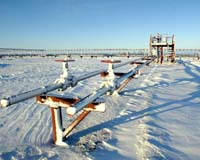 |
Ashgabat (AFP) Nov 22, 2009 Turkmenistan has become the latest target of China's hunger for energy, spelling danger for Europe's hopes of making the reclusive gas-rich Central Asian state a major source of its energy supplies. Beijing has invested heavily in Turkmenistan this year, loaning Ashgabat billions and eyeing its largest gas field as part of a broader strategy to wrap up Central Asian energy resources to feed its energy-starved industries. The European Union, which has long courted Ashgabat as a possible direct source of natural gas shipments to break its dependence on Russian energy supplies, has been slow to counter China's push. "There's no wonder that the Chinese are moving rapidly," Richard Jones, Deputy Executive Director of the International Energy Agency told AFP on the sidelines of a energy conference in Ashgabat. "They're moving all over the world in oil and gas and even coal. "Right now... the Chinese have a progressive leadership and they're doing things more quickly than Europe, which isn't a country, it's a consortium of 30 countries," he added. Turkmenistan, an isolated and repressive ex-Soviet republic bordering the Caspian Sea, is believed to hold the world's fourth largest reserves of natural gas, although comprehensive studies of its fields have not yet been concluded. Ruled for two decades by eccentric dictator Saparmurat Niyazov, who died in 2006, Turkmenistan failed to invest in either production or diversifying export routes, spending instead on one of the world's most lavish personality cults. This left Moscow with a near monopoloy on Turkmen energy exports through its network of aging Soviet-era pipelines, a problem highlighted when a pipeline explosion earlier this year ground exports to a halt. Russian energy-giant Gazprom, which uses Turkmen gas to boost its supplies to Europe, has insisted on lower prices from Turkmenistan as demand from its EU customers has plummeted as a result of the global financial slowdown. Ashgabat is believed to have been losing as much as one billion dollars a month on exports during the row, which had raised hopes that the reclusive state might be more receptive to offers from Western energy firms. Turkmenistan has also long been a proposed supplier for the stagnated Nabucco project, a trans-Caspian pipeline which would theoretically deliver Turkmen gas to the heart of Europe, allowing it to bypass Russia. But while Europe has struggled to overcome the political and technical stumbling blocks of Nabucco, China has moved swiftly to fill the gap, said a senior Western diplomat who requested anonymity. Beijing in June gave Ashgabat a four billion dollar (2.68 billion euro) loan seen as an attempt to win the rights to Turkmenistan's massive South Yolotan gas field, and it will soon unveil a 7,000-kilometre pipeline for Turkmen gas. "It's easier for them to work with the CNPC (China National Petroleum Company) because to them, it's China Inc. They get the technology, the funding, etc. all wrapped up in one package," the diplomat said. "The way they operate, they control the actual production. The Chinese make it quite attractive to them, because they can add credits." But the news hasn't been all bad for European energy firms this year, despite their inability to keep pace with Beijing. German firm RWE, a member of the Nabucco pipeline consortium, concluded an exploration and production deal in the Turkmen section of the Caspian earlier this year. The deal, struck in July at the height of the row between Russia and Turkmenistan, was widely seen as a signal from Ashgabat that it was considering throwing its weight behind the project. Although a spokeswoman for RWE declined to comment on the political significance of the deal, she said that the firm viewed the deal as a first step on gaining greater access to the isolated state's energy riches. "What I'd suggest is to take it as a starting point for a long-term partnership. This is what we're aiming for: a long-term, sustainable relationship with Turkmenistan," spokeswoman Carolin Reese said. Share This Article With Planet Earth
Related Links Powering The World in the 21st Century at Energy-Daily.com
 Permafrost thaw threatens Russia oil and gas complex: study
Permafrost thaw threatens Russia oil and gas complex: studyMoscow (AFP) Nov 20, 2009 Thawing permafrost caused by global warming is costing Russian energy firms billions of dollars annually in damage control and shrinking Russia's territory, Greenpeace warned in a new study Friday. According to the report by the environmental watchdog, up to 55 billion roubles (1.9 billion dollars) a year is spent on repairs to infrastructure and pipelines damaged by changes in the ... read more |
|
| The content herein, unless otherwise known to be public domain, are Copyright 1995-2009 - SpaceDaily. AFP and UPI Wire Stories are copyright Agence France-Presse and United Press International. ESA Portal Reports are copyright European Space Agency. All NASA sourced material is public domain. Additional copyrights may apply in whole or part to other bona fide parties. Advertising does not imply endorsement,agreement or approval of any opinions, statements or information provided by SpaceDaily on any Web page published or hosted by SpaceDaily. Privacy Statement |